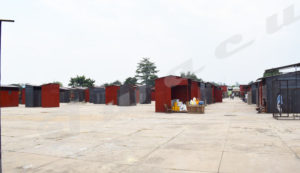Opened on 10 September, the third of shops and stands already constructed are occupied in the newly rehabilitated market located in Ntahangwa municipality in the north of the capital Bujumbura. That market has about 930 places of stands and 320 shops.

Despite its opening, several stands and shops of Ngagara Markets are still under constructions
Anastase Sazi, commissioner of Ngagara market says traders must construct their own shops amounting to BIF 695,000 each while those who will build stands will have to pay BIF 150,000 each. He says traders have joined other markets after the relocation of the market due to rehabilitation activities. “They come in twos and threes,” he says.
Sazi also says each item or each category of items must have its own place. “It’s impossible to mix items when they are not from the same category,” he says. Vegetables, tubers, grains… are exhibited in different places according to their categories. Wholesalers and retailers have also their separate places. However, some products were mixed despite market regulations. “We don’t expect to continue selling different items in one place”, says a vendor of vegetables and grains.
Traders with small capitals complain about the excessive fees required to erect stands. “How can I have means to build my stand for BIF150, 000 while my capital is less than BIF 100,000?” says a vendor of vegetables.
She says the new market regulations will cause traders to go bankrupt. “Some of us have already given up their places and sell their items in other markets namely “COTEBU””; says another vendor. Due to the lack of customers, traders in Ngagara market say they do not operate in the afternoon. “How can I work the whole day when I sell one item?” says a vendor of bananas.
The market commissioner says those who have not yet constructed their shops and stands will be granted an extra time to do so. “Otherwise, the places will be distributed to other traders,” he says.
Besides Ngagara rehabilitated market, two others namely Musaga and Kinindo out of six rehabilitated markets in the capital Bujumbura have reopened and resumed activities since the past two months. Ruziba market which was completely constructed hasn’t yet opened.
Those peripheral rehabilitated markets have been built since January 2016 thanks to the financial support of EU amounting to four million of Euro.



















 IWACU Open Data
IWACU Open Data

